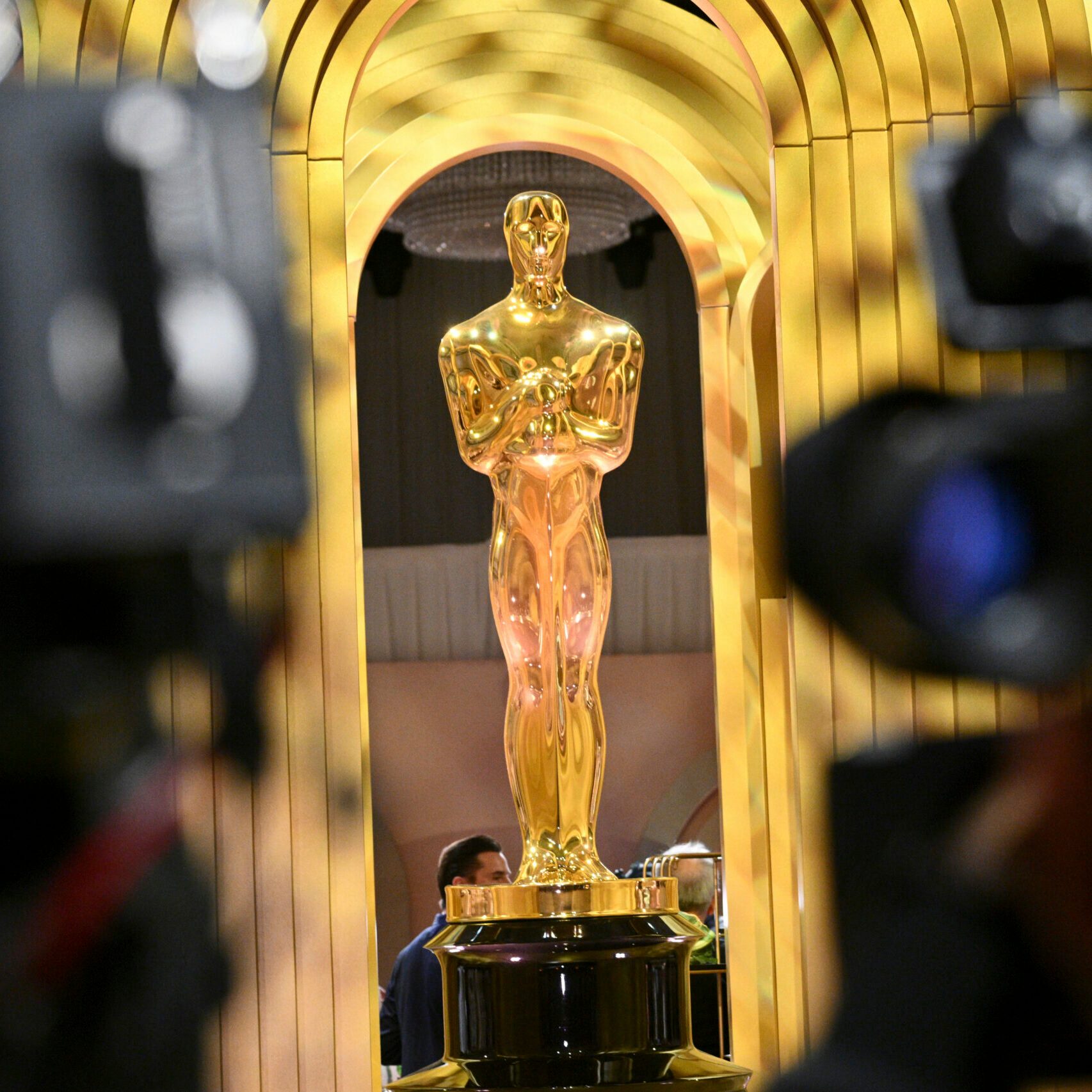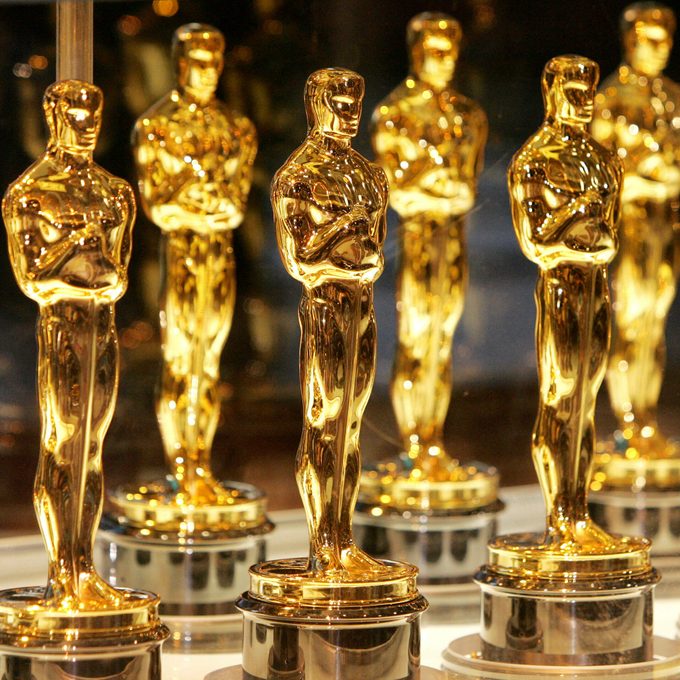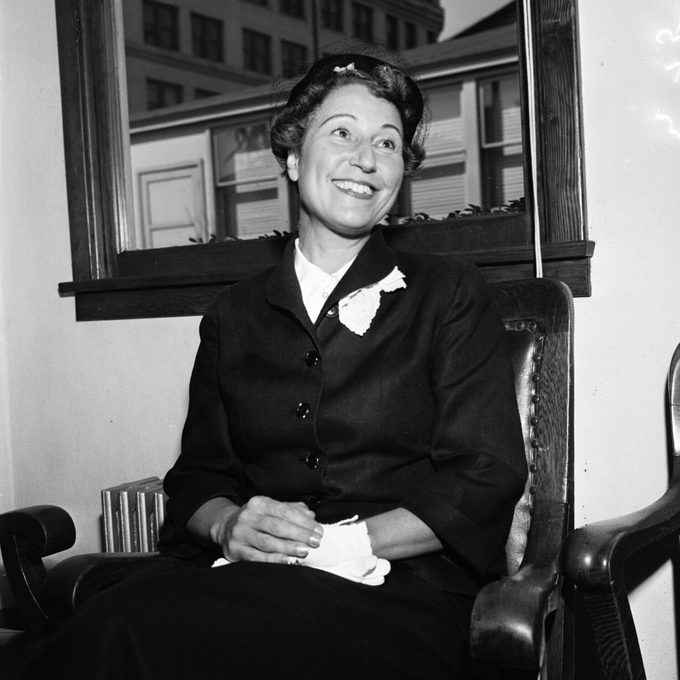Learn the potential origins of the golden statuette's iconic nickname, straight from an Oscars expert

Here’s Why an Academy Award Is Called an Oscar

If you believe the professional prognosticators—and the Las Vegas bookies—Adrien Brody, Demi Moore, Kieran Culkin and Zoe Saldaña are just some of the names you’ll likely hear during Hollywood’s biggest night on March 2. But one first name will be mentioned more than any other. He’s not an agent, a publicist or a higher power, and he’s nearly 100 years old. That’s right: It’s good ol’ Oscar. Which begs the question: Why are Academy Awards called Oscars?
Well, that’s a story worthy of its own award-winning movie. Or, at the very least, a nominated documentary short. In fact, Bruce Davis, the academy’s executive director from 1989 through 2011, traced the rumors and unearthed some fascinating information for his 2022 book, The Academy and the Award, yet he still couldn’t 100% determine the true story.
“The reason we don’t know how and why the name started is because the main theories that have been passed down don’t make any sense,” Michael Schulman, an Oscar expert and the author of the 2023 book Oscar Wars: A History of Hollywood in Gold, Sweat, and Tears, explains to Reader’s Digest. “People just took the best story and ran with it.”
Read on to brush up on your Hollywood history and learn the theories behind the Academy Awards‘ nickname—and determine your own winner.
Get Reader’s Digest’s Read Up newsletter for more entertainment, humor, travel, tech and fun facts all week long.
How long has the Academy Award statuette been around?

These little gold guys have been around a long time—since May 16, 1929, to be exact. That’s when members of the newly formed Academy of Motion Picture Arts and Sciences held a private dinner in the Hollywood Roosevelt Hotel’s Blossom Room in downtown Los Angeles to hand out honors officially called the Academy Award of Merit.
The inaugural ceremony
The Academy of Motion Picture Arts and Sciences director Douglas Fairbanks hosted a ceremony that looked quite unlike today’s spectacle: The academy announced the winners before the event, delivered only 15 trophies and wrapped it all up in 15 minutes, a far cry from the modern three-hour show.
So who took home those very first awards? Best Picture went to the classic movie Wings, which remains the only silent film ever to win the prize. (Though The Artist won in 2012, it featured sound effects and brief dialogue.) Emil Jannings took home Best Actor (for The Last Command and The Way of All Flesh), and Janet Gaynor took Best Actress for three of her films. Charlie Chaplin earned an honorary award too.
The first trophies
MGM art director Cedric Gibbons sketched the figure of a knight gripping a sword and standing in front of a reel of film. He then chose Los Angeles sculptor George Stanley to craft a three-dimensional design. The five spokes of the reel stood for the original five branches of the academy—actors, directors, producers, technicians and writers—and the sword symbolized protection for the welfare of the industry.
Today, the statuettes are hand-cast in bronze and plated in 24-karat gold. FYI, due to a metal shortage during World War II, Oscars were made of painted plaster for three years; the academy later invited recipients to redeem the plaster figures for gold-plated metal ones.
The statue’s design hasn’t changed much over the years, except for the size of the base. It’s also heavy, standing at 13.5 inches tall and weighing 8.5 pounds. By comparison, the Grammy and the Emmy are each about 6 pounds, and the Tony is a little under 2 pounds.
When did it get the nickname Oscar?
According to the academy, the nickname wasn’t officially adopted until a full decade later, in 1939. But it was so widely known by 1934 that Hollywood columnist Sidney Skolsky used it in a piece referring to Katharine Hepburn’s first Best Actress win (for 1933’s Morning Glory). The academy trademarked the name Oscar (and “Academy Awards”) in 1979, solidifying the link.
So why are the Academy Awards called Oscars?

Alas, everyone who can confirm an official backstory is long gone. Here are the three contending theories on why Academy Awards are called Oscars:
The librarian and her uncle
As popular legend goes, academy librarian and future executive director Margaret Herrick (pictured above) publicly noted that the bald figure resembled “my dear Uncle Oscar.” Cut to the academy staff referring to it as Oscar.
Just one snag in the story: No dear Uncle Oscar existed. And Davis wrote in his book that “Mrs. Herrick was never able to produce an uncle with that name.”
Schulman points out that Herrick had a cousin on her mother’s side named Oscar Pierce, but he was a Texas wheat farmer whom she didn’t meet until a family funeral in the 1940s. “I think the theory caught on because Margaret Herrick was such a beloved institution in the academy,” he says. “So the idea that she would christen the name is very appealing.”
The legendary actress and her husband
Bette Davis wrote in her 1962 autobiography, The Lonely Life, that when accepting her Best Actress award in 1936 for Dangerous, she recognized the backside of the “Hollywood male” and explained that it could only belong to her then-husband, Harmon Oscar Nelson Jr. Here’s the money quote: “I stared at the little gold-plated man in the palm of my hand,” Davis wrote. “In a kind of madness, his backview was the spit of my husband’s. … Oscar it has been ever since.”
However, because the term had appeared in newspapers years before Davis won her Oscar, the star eventually had to recant her statement. As she told author Whitney Stine in her 1974 biography, Mother Goddam, “A sillier controversy never existed. I don’t feel my fame and fortune came from naming Oscar ‘Oscar.’ I relinquish once and for all any claim.”
The columnist and the deadline
In his 1975 memoir, Don’t Get Me Wrong—I Love Hollywood, Skolsky took full credit for the name, explaining that he wrote Oscar because he was stumped by the spelling of the word statuette on deadline. The transplanted New Yorker claimed that he referenced old vaudeville comedy shows in which a comedian would ask an orchestra leader, “Will you have a cigar, Oscar?”
But historians take issue with Skolsky’s account because the term Oscar appeared in an entertainment column in the defunct Los Angeles Post-Record on Dec. 5, 1933. That was six weeks before Skolsky’s alleged moment of inspiration. Indeed, Schulman points out that in Skolsky’s 1934 column, he wrote, “To the profession, the statues are called Oscars.” Given that evidence, Schulman points out, “Skolsky is referring to a name that had already caught on.”
Which theory is true?
The answer as to why Academy Awards are called Oscars may be none of the above. In Davis’s book, he floats a fourth theory involving a 1930s-era academy secretary and general office assistant named Eleanore Lilleberg. After carefully sifting through research (including an unpublished manuscript from her brother, Einar), Davis asserts that she grew up in a Chicago neighborhood with a man named Oscar who had been in the Norwegian army and was known for the way he stood up straight and tall. She coined the nickname in the office with a nod to said neighbor and his excellent posture, and the other members followed suit.
Schulman admits that the story sounds a bit far-fetched. But he casts his vote for it: “Unlike the other theories,” he says, “there’s no evidence against it!”
About the expert
|
Why trust us
At Reader’s Digest, we’re committed to producing high-quality content by writers with expertise and experience in their field in consultation with relevant, qualified experts. We rely on reputable primary sources, including government and professional organizations and academic institutions as well as our writers’ personal experiences where appropriate. For this piece on why Academy Awards are called Oscars, Mara Reinstein tapped her two decades of experience as an entertainment journalist, film critic and pop culture expert. We verify all facts and data, back them with credible sourcing and revisit them over time to ensure they remain accurate and up to date. Read more about our team, our contributors and our editorial policies.
Sources:
- Michael Schulman, Oscars expert and the author of Oscar Wars: A History of Hollywood in Gold, Sweat, and Tears; phone interview, Feb. 19, 2025
- Oscars: “Oscar Statuette”
- AV Club: “New book offers what is apparently the real story of why an Oscar is called an Oscar”






















